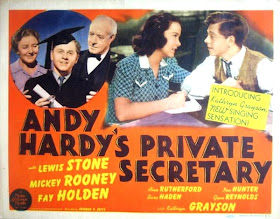 |
| Efrem Zimbalist Jr. and Jack Kelly |
"I'm only allowed a minute so I'm going to change the habit of a lifetime and be brief."
When a woman is suffocated in her home, her estranged husband (Rhodes Reason of Voodoo Island) is arrested and put on trial. He is almost a supernumerary in a three-way battle for governor between Callahan (Jack Kelly), the D.A. prosecuting the case; Hoffman (Efrem Zimbalist Jr.), the judge assigned to the trial; and Senator Alex Simon (Don Ameche), who wants to give up his seat for personal reasons. The audience knows who the real killer is from the first, but Callahan seems determined to win this case -- and his chance at a governorship -- no matter who is convicted. Then Senator Simon offers Hoffman a bribe if he'll declare a mistrial, postponing Callahan's chances for a prosecutorial and political victory. A Fever in the Blood features a few Warner Brothers contract players who are sometimes effective and sometimes not. Zimbalist isn't bad, but aside from playing Stu Bailey in 77 Sunset Strip, he's a trifle bland, as usual, and strictly a small screen personality. Jack Kelly [Drive a Crooked Road], also a TV regular, is surprisingly good as Callahan, as is Don Ameche [Guest Wife], who manages to overcome his miscasting. Angie Dickinson scores as Simon's wife, who is really in love with Hoffman (she has a very good scene with Zimbalist early in the film), and there are also notable performances from Herbert Mashall as the defendant's father, Carroll O'Connor as a publisher, Ray Danton as defense counsel, and Robert Colbert as the murdered woman's gardener and lover. If there's any problem with the movie it's that with this excellent plot the movie should have had a lot more tension and excitement, but it merely plays out in standard fashion while managing to hold the attention. Ernest Gold's Herrmann-like score is effective.
Verdict: Not bad, but perhaps its temperature should have been raised. **1/2.























